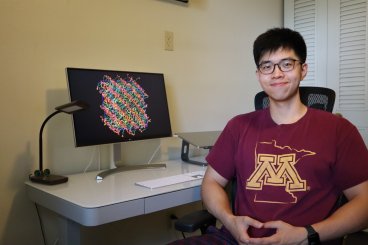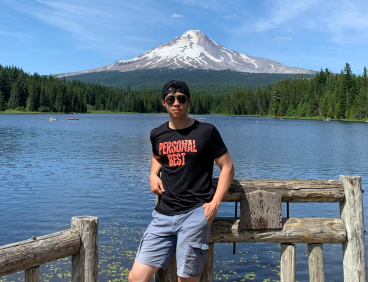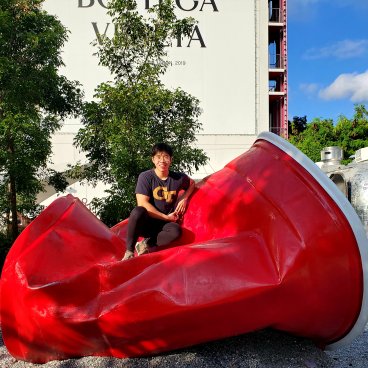Meet CTC: Don Shen

08/02/2020 -- Don Shen is a fourth-year chemical engineering Ph.D. student co-advised by Ilja Siepmann and Tim Lodge. Before coming to the University of Minnesota, he graduated from Georgia Institute of Technology with a bachelor’s degree in Chemical and Biomolecular Engineering.
Don is currently computationally modeling phase behavior in polymeric systems. He is also designing new materials using the molecular-level insights provided by the simulation, including applying machine learning techniques to aid in material discovery. Some of the designed self-assembling amphiphiles, which are chemical compounds possessing both hydrophilic (water-loving) and lipophilic (fat-loving) properties, are able to form ordered domain units with a feature size of 1 nanometer (nm). These can be used for feature miniaturization in many applications. “Miniaturization is becoming more important. For example, it can be used to produce templates for microelectronics, such as computer chips, with smaller characteristics, or it can be used to design nanoporous membrane for reverse osmosis.”

For his research, Don uses both Monte Carlo (MC) and Molecular Dynamics (MD) simulations. He then applies deep learning models, which are large neural networks that try to mimic the decision making of the human brain, to analyze and interpret the large amount of data generated by his simulations.
Outside of school and research, Don plays sports, including basketball, swimming, and weight lifting. He also enjoys playing video games to relieve stress. He cooks a lot and enjoys eating his meals while watching movies. Don’s favorite part about living in the Twin Cities is the summer because there is great weather for kayaking and hiking.
How did you become interested in studying chemical systems and processes, and what gets you the most excited about your field?
I became interested in chemistry in middle school. I enjoyed watching chemistry experiments and built a mini lab at home, where I mixed different chemicals together and saw interesting, and sometimes dangerous, results happen. I am now in the computational chemistry field rather than the experimental chemistry field, and I am excited about modeling complex chemical systems, which gives me molecular-level insights that could lead to material design and discovery.

Why did you choose the University of Minnesota, and what led you to join your current research group?
I chose the University of Minnesota (UMN) because of its undeniable strength in the field of chemical engineering. I became interested in computational chemistry when I started school in Minnesota after seeing the incredible computational resources both in Dr. Siepmann’s group and in the Minnesota Supercomputing Institute (MSI). I became specifically interested in my project because of its strong relation with polymer science, and the highly collaborative environment offered by the University of Minnesota Materials Research Science and Engineering Center (MRSEC) that supports my research work. I also like how computational groups function with high flexibility in both working location and hours.
What do you enjoy most about your research? What has been your most interesting or surprising finding so far?
I enjoy unraveling the underlying physics behind the observed phenomena of molecular systems by writing analysis codes and visualization. For example, I discovered a series of triblock oligomers, which tend to self-assemble into lamellar structures with very small (1-2 nm) domain periods. From the simulated molecular configurations, I found that most of the molecules are fairly stretched, forming “bridges” that connect two distinct domains. Some of the molecules are in a “U” shaped confirmation that form “loops” with both head and tail connecting the same domain. A large fraction of bridges connecting distinct nanodomains might generate extra mechanical strength to the materials.

What are you most proud of about your academic career so far, and what’s one thing you’d like to achieve in the future?
I’m proud that I am currently finishing two different projects, and I already have new ideas in mind. In the future, I’d like to widely apply machine learning/deep learning models that can facilitate material discovery.
What drives you to be a better scientist?
I am driven by my genuine interest in the field and the continuous discussion and learning from other scientists. I also want to embrace and learn new technology from others in the field.
What advice do you have for aspiring scientists?
Sometimes we get stuck and feel upset about not seeing any progress of the project. To combat these feelings, I like to focus on my work-life balance, which helps me relax and prepare for a better start.
